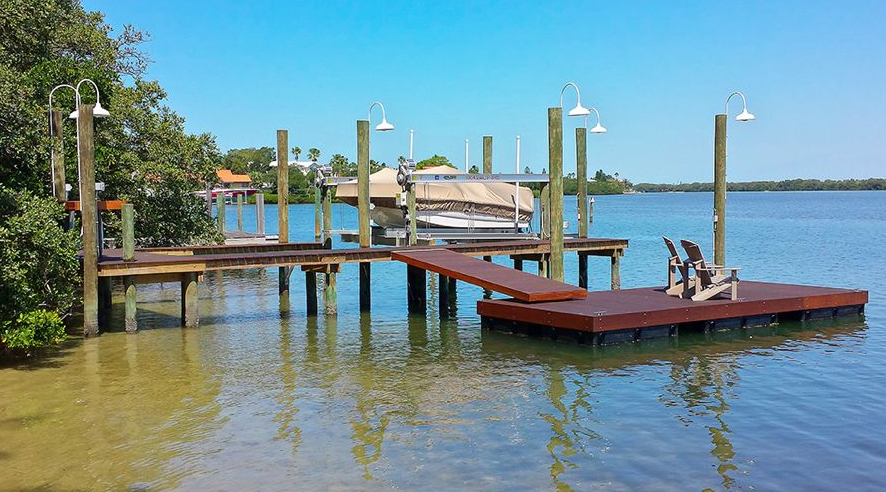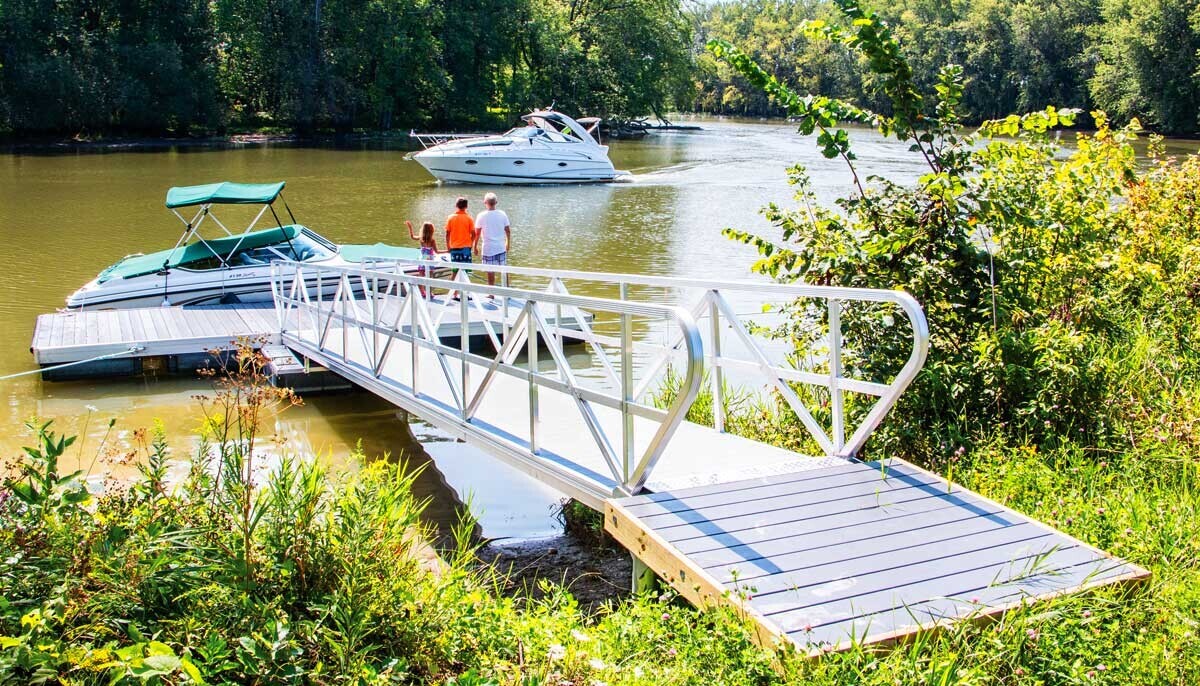Just How Floating Dock Company Expertise Can Boost Your Beachfront Experience
Floating Docks: The Perfect Choice for Versatile Water Access
Floating docks present a compelling solution for a variety of water gain access to needs, using convenience that goes beyond traditional mooring options. Their capability to adjust to ever-changing water degrees while ensuring stability and safety makes them particularly advantageous for both industrial and entertainment applications. The modular nature of floating docks promotes modification, catering to particular needs. The nuances of setup and upkeep, alongside the variety of applications, necessitate a closer examination to fully value their possible advantages and ramifications for waterway accessibility approaches.
Advantages of Floating Docks
Floating docks offer countless benefits that boost water access for different applications. Their capacity to drop and rise with altering water degrees makes them particularly helpful in environments with changing tides or seasonal variants. This adaptability ensures that vessels can quickly tie without problem for the water's depth, supplying a trustworthy system for recreational, commercial, and industrial uses.
Additionally, floating docks are typically built from sturdy products that resist deterioration, making them suitable for long-lasting use in aquatic atmospheres. Their installation is typically less invasive than standard set docks, lowering the environmental impact and helping with quicker release (floating dock builder). This versatility permits less complicated moving or reconfiguration according to individual demands or environmental modifications
Safety and security is an additional crucial advantage; floating docks can provide steady access for individuals disembarking or boarding from boats and decrease the risk of mishaps linked with unsteady surface areas. They can be designed to fit a variety of accessories, such as fenders and cleats, improving capability. On the whole, floating docks represent an effective option for enhancing water gain access to across diverse sectors while advertising safety and environmental sustainability.

Kinds Of Floating Docks
Numerous kinds of floating docks satisfy different requirements and environments, each designed with details features to enhance functionality. One of the most common types include modular docks, which include interlacing areas that permit simple customization and growth. These docks are perfect for recreational usage, as they can be tailored to fit numerous boat dimensions and water conditions.
An additional prominent choice is the stationary floating dock, which continues to be secured in position yet drifts with altering water levels. floating dock company. This type is especially matched for locations with very little tidal fluctuations, supplying stable access for angling or swimming. Additionally, there are drive-on docks, which include a sloped layout that permits boats to quickly drive on and off, making them appropriate for individual watercraft and smaller sized vessels
For commercial applications, durable floating docks are offered, constructed from enhanced materials to hold up against considerable loads and extreme aquatic environments. Environment-friendly floating docks use lasting products and layouts to lessen ecological impact, frequently incorporating attributes like plants to support local wild animals. Comprehending the various sorts of floating docks ensures that users can pick the most suitable service for their details demands.
Installation Process Review
A successful installment of floating docks needs cautious preparation and interest to information to make certain optimal performance and security. The initial action involves evaluating the website problems, consisting of water depth, present, and potential obstacles. This assessment informs the choice of the appropriate dock products and style tailored to the certain setting.
Following, acquiring needed licenses is crucial, as many territories have regulations regarding building on water bodies. As soon as permissions are protected, the installation can continue. Begin by preparing the foundation, which may involve anchoring systems or pilings tailored to the dock type and local conditions.
Adhering to the structure configuration, put together the dock areas according to supplier specs. Make sure that all components are safely fastened and lined up to hold up against environmental tensions. Placement the dock in the assigned location, ensuring it is degree and steady.

Maintenance Tips and Ideal Practices
After the installation procedure is full, recurring upkeep plays an essential role in making certain the longevity and performance of floating docks. Normal inspections should be conducted to recognize any type of signs of wear, damage, or deterioration - floating dock services. Inspect for any type of loosened installations, cracks, or splitting up in the dock areas, as these can jeopardize architectural stability
Cleaning up the dock is important to navigate here eliminate particles, algae, and other accumulation that can affect its look and safety and security. Utilize a mild pressure laundry periodically to keep cleanliness without creating damages to the surface area. Additionally, using a safety sealer see post every couple of years can help boost longevity and resist environmental wear.
Take notice of the mooring lines and anchors, guaranteeing they are totally free and safe from deterioration. Change any degraded components quickly to prevent dangers. Seasonal changes may likewise be required; during severe weather problems, reinforcing the dock or rearranging can prevent damage.
Applications for Floating Docks
Floating docks offer a wide range of applications, dealing with both industrial and leisure requirements. In recreational setups, they give smooth access to rivers for tasks such as boating, angling, and swimming. Their adjustable nature permits setup in varying water degrees, making sure secure and safe accessibility regardless of tidal fluctuations.
Readily, floating docks are crucial for marinas and waterfront services. They facilitate the docking of vessels, allowing efficient discharging and filling of goods. Their modular style permits for easy growth or reconfiguration to accommodate changing organization demands, making them ideal for watercraft leasings, trip procedures, or fishing charters.
In addition, floating docks are utilized in environmental applications such as marine research study and environment reconstruction. They can work as my sources systems for scientific studies, keeping an eye on water high quality, or carrying out wildlife studies without troubling delicate ecological communities.
In commercial contexts, floating docks are used in building and construction projects, supplying access to hard-to-reach areas for equipment and employees. Their adaptability, durability, and very little effect on the atmosphere make them an optimal choice for a wide variety of applications, improving both functionality and ease of access in numerous water-based atmospheres.
Final Thought
Finally, floating docks represent an optimum remedy for diverse water accessibility requires, owing to their flexibility, sturdiness, and modular style. These structures assist in risk-free mooring for numerous applications while lessening ecological influence during installation. The decreased upkeep needs better enhance their functionality. As such, floating docks act as an important asset for entertainment, business, and ecological tasks, making certain dependable access to waterways and promoting sustainable methods in aquatic environments.
Floating docks existing a compelling remedy for a variety of water gain access to requires, providing convenience that transcends traditional mooring choices.Floating docks deal various benefits that improve water gain access to for numerous applications. Overall, floating docks stand for a reliable option for improving water accessibility throughout varied industries while promoting security and environmental sustainability.
One more preferred option is the stationary floating dock, which remains secured in place yet drifts with transforming water degrees.In verdict, floating docks represent an ideal solution for varied water accessibility requires, owing to their flexibility, toughness, and modular design.